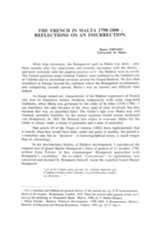THE FRENCH IN MALTA 1798-1800 : REFLECTIONS ON AN INSURRECTION.
Henri FRENDO Université de Malte.
More than elsewhere, the Bonapartist spell in Malta was short : only three months after the cataclysmic and tromatic encounter with the theory - and more seriously with the suppose practice of it - the Maltese were in revolt. The French garnison under Général Vaubois were confined to the fortified city of Valletta and its immediate environs around the Grand Harbour. No less than elsewhere in Europe beyond the continent where the Bonapartist revolutionary and conquering crusade spread, Malta's was an intense and difficult time indeed.
As things turned out, characteristic of the Maltese experience of French rule was its transitory nature, breaking temporarily with some long-held traditions, when Malta was governed by the order of St-John (1530-1798).' I say transitory not only because of the short span of time involved, but also because this was an unsettled time? The Order's rule over Malta was still claimed, probably lawfully, by the ousted Austrian Grand master ferdinand von Hompesch. In 1801 the Britisch had orders to evacuate Malta for the Order to return, under a treaty of guarantee and a state of neutrality.
Had article 10 of the Treaty of Amiens (1802) been implemented; that it exactly what they would have done, under one guise or another, the period is a transitory one, but its "duration ", in historiographical terms, is much longer than its chronology.
In my documentary history of Maltese development, I reproduced the original text of grand Master Hompesch' s letter of protest of 12 October 1798, written from Trieste. In this communique' Hompesch quarrelled with Bonaparte's vocabulary : the so-called "Convention", or capitulation, was conceived and dictated by Bonaparte himself, wrote the expelled Grand Master Hompesch -
"cet écrit n 'étant autre qu 'une loi violente imposée pat- ci' infâmes traîtres dont l'ennemi s'est prévalu pour remplir ses desseins... " 2
1 - For a standard and influencial general history of this period see e.g. E.W.Schermerhorn : Malta of the knights. Heinemann, London, 1929. There are several other general works on it. See e.g. the anthology in Hospitaller Malta Mireva, 1996, ed. V. Mallia-Milanes.
2 -Henry Frendo : Maltese Political Development 1798-1964. A Documentary History. Ministry of Education and Human Ressources. Valletta. 1993. pp. 16-17. Doc.5.





















